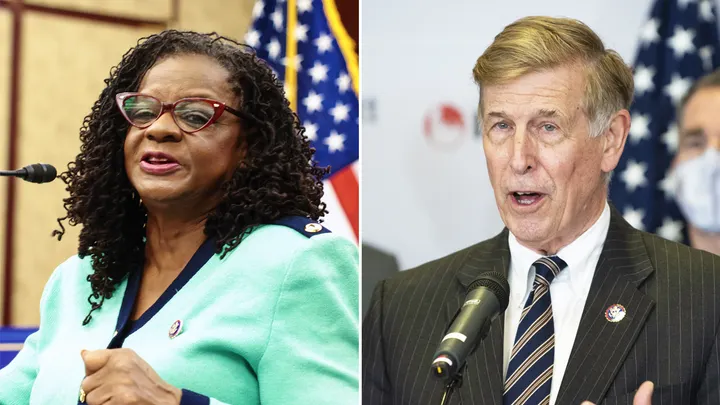Republicans say the increase in IRS funding will be used to crack down on small business owners and lower-income workers
Democrats are moving to defend a proposed expansion of the Internal Revenue Service (IRS) under the Inflation Reduction Act, claiming that the increase in funding for the IRS will address the agency's "declining customer service" and not result in higher taxes for Americans making less than $400,000.
The proposed expansion includes an $80 billion boost to the IRS over a 10-year period, with more than half intended to help the agency crack down on tax evasion.
If the bill is passed, the money allotted would go toward filling 87,000 IRS positions, more than doubling the agency's current size. The measure, expected to receive a vote in the House on Friday, passed in the Senate over the weekend when Vice President Kamala Harris cast a tie-breaking vote.
"Let me be clear: No family making less than $400,000 will directly pay higher taxes," Rep. Gwen Moore, D-Wis., said in a statement to Fox News Digital. "Also, people will benefit from green energy tax credits, ACA premium subsidies and other crucial incentives."
MIDDLE-CLASS AMERICANS TO BEAR BRUNT OF IRS AUDITS UNDER DEM INFLATION BILL, ANALYSIS SHOWS

Democratic Reps. Gwen Moore of Wisconsin and Don Beyer of Virginia (Anna Moneymaker, Caroline Brehman/CQ-Roll Call, Inc via Getty Images)
"The Inflation Reduction Act increases IRS tax enforcement funding to go after sophisticated wealthy individuals and large corporations who dodge taxation, so they can finally pay their fair share, too," Moore added. "Unlike the GOP’s $2 trillion tax giveaway to the wealthy and big corporations, our tax policies will deliver a fairer tax system for working people."
Senate Democrats projected that enhancing IRS funding could add an extra $124 billion in federal revenue over the next decade by hiring more tax enforcers who can crack down on rich individuals and corporations attempting to evade taxes.
But Republicans warn the bill will fund an "army" of IRS agents to crack down on small business owners and lower-income workers. Americans who earn less than $75,000 per year are slated to receive 60% of the additional tax audits expected under the Democrats' spending package, according to an analysis released by House Republicans.